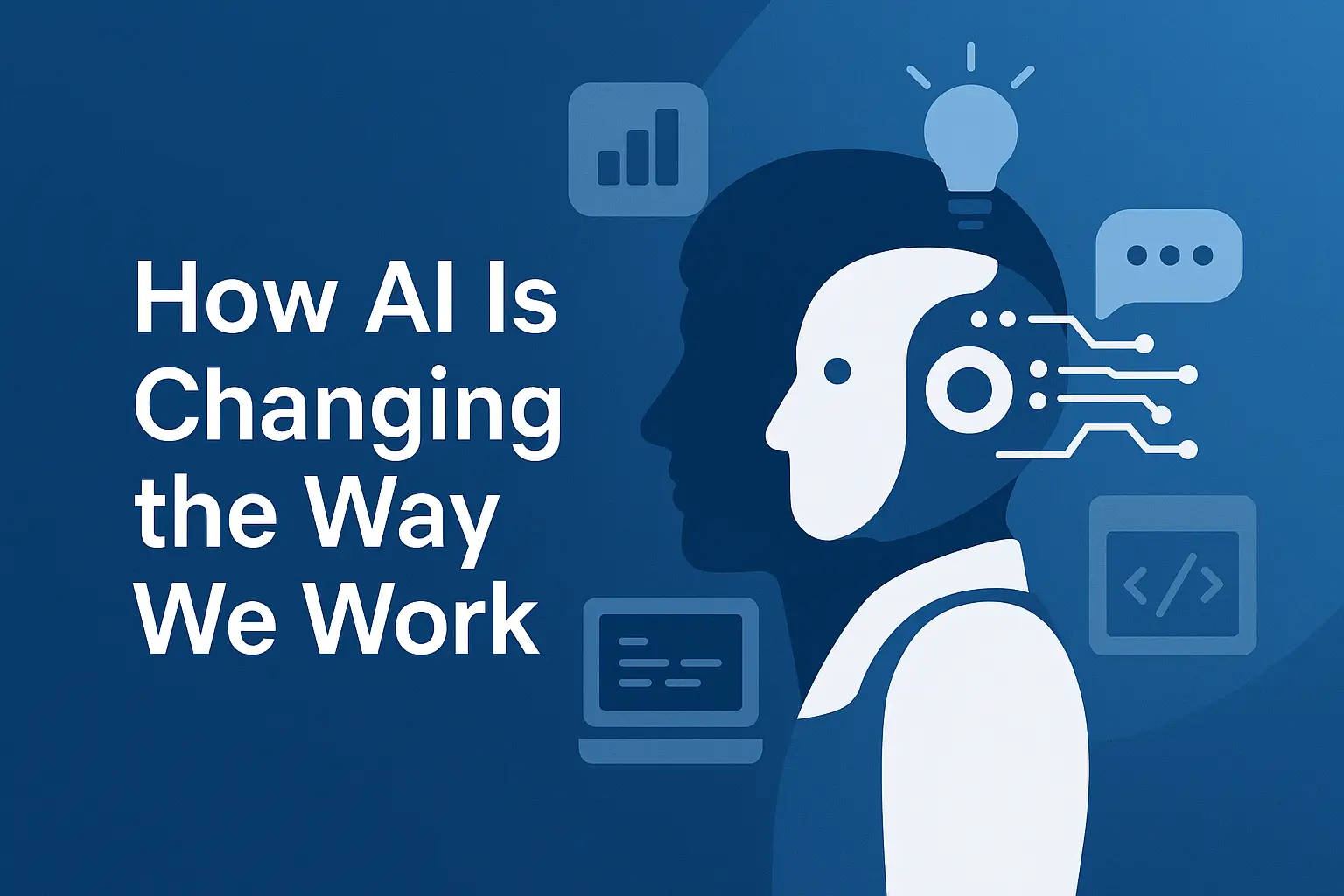Artificial Intelligence (AI) is transforming the workplace, reshaping roles, streamlining operations, and creating new possibilities for collaboration, productivity, and innovation. From automating repetitive tasks to enabling smarter decision-making, AI is redefining how, where, and why we work.
In this article, we’ll explore how AI is influencing modern work environments, the benefits and challenges it brings, and how workers and businesses can adapt to thrive.
AI at Work: A Quick Overview
AI refers to systems that can perform tasks that typically require human intelligence, such as learning, problem-solving, language processing, and decision-making. In the workplace, AI is used to:
- Automate routine or time-consuming tasks
- Enhance employee productivity
- Deliver data-driven insights
- Personalize customer and employee experiences
- Improve operational efficiency
These capabilities are applicable across every industry—from retail and healthcare to marketing, logistics, and education.
Key Ways AI Is Changing the Workplace
1. Automating Repetitive Tasks
AI excels at handling high-volume, rule-based tasks, freeing up employees for more complex, creative, and strategic work.
Examples:
- Processing invoices and payroll
- Data entry and validation
- Scheduling and calendar management
- Customer service queries via chatbots
Benefit: Reduces errors and boosts productivity.
2. Enhancing Decision-Making
AI analyzes large datasets to identify trends, patterns, and anomalies, enabling smarter, faster decisions.
Use Cases:
- Sales forecasting
- Risk assessment in finance and insurance
- Healthcare diagnostics
- Supply chain optimization
Outcome: Data-informed strategies and competitive advantage.
3. Supporting Remote and Hybrid Work
AI tools enable collaboration and productivity for distributed teams.
Examples:
- Virtual meeting assistants that summarize discussions and highlight key action points
- AI-driven project management tools
- Smart transcription and language translation tools
Benefit: Improves communication and reduces friction in remote settings.
4. Improving Recruitment and HR Processes
AI helps companies find and retain talent more effectively.
Applications:
- Resume screening and shortlisting
- Predictive analytics to forecast employee success or turnover
- AI chatbots to answer candidate questions
- Personalized onboarding experiences
5. Personalizing Learning and Development
AI enables customized training programs that adapt to each employee’s learning style, pace, and goals.
Platforms like: Coursera, LinkedIn Learning, and edX use AI to recommend tailored courses and resources.
6. Enabling Human-AI Collaboration
Rather than replacing humans, AI often acts as a co-pilot—providing suggestions, insights, and support to enhance human creativity and expertise.
Example:
Writers use ChatGPT to brainstorm ideas; designers use DALL·E for concept art.
7. Advancing Workplace Safety and Compliance
AI-powered sensors and monitoring systems can detect hazards, enforce safety protocols, and ensure regulatory compliance.
Example:
AI systems in warehouses flag unsafe behavior or malfunctioning equipment in real time.
Industries Experiencing Major AI Impact
- Healthcare: AI supports diagnostics, patient monitoring, and administrative automation.
- Finance: AI handles fraud detection, risk management, and customer support.
- Retail: AI powers recommendation engines, inventory management, and chatbot assistants.
- Manufacturing: AI optimizes production lines and predicts equipment maintenance needs.
- Marketing: AI drives personalized campaigns, audience segmentation, and content creation.
Benefits of AI in the Workplace
- Increased Efficiency: Automates routine tasks, saving time and resources
- Higher Accuracy: Minimizes errors in data-heavy processes
- Faster Innovation: Enables rapid testing and feedback loops
- Improved Employee Experience: Reduces burnout by eliminating monotonous tasks
- Scalability: Helps small teams manage large volumes of work
Challenges and Considerations
1. Job Displacement
While AI creates new roles, it may also replace some traditional jobs—especially those focused on repetitive tasks.
Solution: Invest in reskilling and upskilling programs.
2. Data Privacy and Security
AI systems process vast amounts of sensitive data, requiring strict privacy controls and ethical use policies.
3. Algorithmic Bias
AI trained on biased data may perpetuate discrimination, especially in hiring or customer interactions.
Solution: Use diverse training datasets and transparent, explainable models.
4. Integration Complexity
Adopting AI can be challenging for small businesses with limited resources or tech expertise.
Solution: Start small with AI-powered tools that integrate easily into existing systems.
Skills Needed in an AI-Powered Workforce
To stay competitive, workers need to develop both technical and soft skills, such as:
- Digital literacy and AI basics
- Data analysis and interpretation
- Creativity and critical thinking
- Emotional intelligence
- Collaboration and communication
Future Trends in AI and Work
- AI-Augmented Roles: Hybrid roles where AI supports human creativity and decision-making
- Lifelong Learning: Continuous skill development driven by AI-curated content
- Autonomous Teams: AI agents collaborating with humans on projects
- Real-Time Insights: Dashboards that deliver actionable insights instantly
- Voice Interfaces: Increasing use of voice for task management and collaboration
Final Thoughts: Evolving with AI
AI is changing not just how we work, but what it means to work. By automating the mundane and enhancing the meaningful, it opens up new opportunities for growth, creativity, and innovation.
For individuals and businesses alike, the future of work is not about competing with AI—it’s about collaborating with it. Those who embrace this shift and adapt accordingly will thrive in the AI-powered world of tomorrow.
